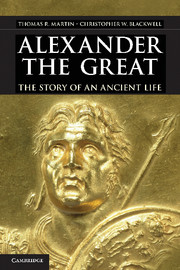Book contents
- Frontmatter
- Contents
- Acknowledgments
- Introduction: The Goal of this Book
- Map 1: European Greece, Macedonia, and Northern Lands
- Map 2: Alexander's Expedition
- 1 The World of Alexander's Birth and His Education in Literature and Warfare (350s and 340s BC)
- 2 Opportunities and Risks asa Teenager (340s to 338 BC)
- 3 The Danger in Replacing a Murdered Father as King (337 to 335 BC)
- 4 The Opening Battles Against the Persian Army (334 to 332 BC)
- 5 Finding God in Egypt and Capturing the Riches of Persia (332 to 330 BC)
- 6 Winning the World as King of Asia (330 to 329 BC)
- 7 Murder, Marriage, and Mixing Customs in Afghanistan (329 to 327 BC)
- 8 Victory and Frustration in India (327 to 326 BC)
- 9 Returning to Babylon and Becoming Divine (326 to 323 BC)
- 10 Remembering and Judging Alexander (323 BC to Now)
- Suggested Readings
- Index
Introduction: The Goal of this Book
Published online by Cambridge University Press: 05 November 2012
- Frontmatter
- Contents
- Acknowledgments
- Introduction: The Goal of this Book
- Map 1: European Greece, Macedonia, and Northern Lands
- Map 2: Alexander's Expedition
- 1 The World of Alexander's Birth and His Education in Literature and Warfare (350s and 340s BC)
- 2 Opportunities and Risks asa Teenager (340s to 338 BC)
- 3 The Danger in Replacing a Murdered Father as King (337 to 335 BC)
- 4 The Opening Battles Against the Persian Army (334 to 332 BC)
- 5 Finding God in Egypt and Capturing the Riches of Persia (332 to 330 BC)
- 6 Winning the World as King of Asia (330 to 329 BC)
- 7 Murder, Marriage, and Mixing Customs in Afghanistan (329 to 327 BC)
- 8 Victory and Frustration in India (327 to 326 BC)
- 9 Returning to Babylon and Becoming Divine (326 to 323 BC)
- 10 Remembering and Judging Alexander (323 BC to Now)
- Suggested Readings
- Index
Summary
Ancient writers agree that Alexander was extraordinary, more like a god than a human in everyone’s eyes – especially his own. In writing this brief biography for non-specialists, we accept the word of those writers based on what seems plausible to our (necessarily limited) understanding of Alexander’s time and place. Our book, therefore, stands on the assumption that the opinions of the ancients must be given great weight, or the story of Alexander’s life will make no sense at all. We are therefore diverging from the approach of some prominent modern scholarship on Alexander, especially the opinion that rejects the value of writing the life of such an enigmatic man. We are writing the story of an ancient life.
Guided by that goal, we pay special attention to the ancient Greek literature that Alexander treasured as sources of inspiration and reflection. His knowledge of these texts reached a depth that is difficult for a modern age to appreciate: to the end of his life, whether sober or drunk, he could recognize, quote, and even enact passages from the authors that meant so much to him, especially Homer and Euripides. The surviving remnants of this literature offer clues to the meaning of Alexander’s words and deeds, and we have tried to include this evidence often (and there would be still more citations in a longer book!). By emphasizing Alexander’s reliance on these texts in understanding his world, his status, and his action, we hope to contribute to a return to a tradition of interpreting Alexander that offers a more source-based view than the modern tendency in some scholarship to see Alexander as little more than a pathological mass murderer.
- Type
- Chapter
- Information
- Alexander the GreatThe Story of an Ancient Life, pp. xi - xiiPublisher: Cambridge University PressPrint publication year: 2012

